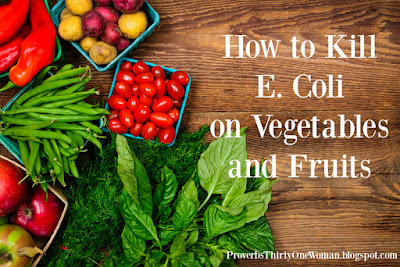First, How Common Are E. Coli Infections?
According to the CDC, there are an estimated 265,000 illnesses E. coli infections in the United States each year. However, it's important to note that this figure is an estimate only; experts say most people don't seek medical care for infections, and even those who do usually don't have a stool test for positive identification. Also remember that not all incidences of E. coli outbreaks are caused by contaminated food. For example, E. coli is also spread by hands (which are usually contaminated with human waste), or when human hands touch (live) animals (for example, at a petting zoo)
Most Internet articles, videos, and news reports about bacteria on produce say to scrub fruits and vegetables in hot water to remove bacteria. But according to Dr. Robert Brackett of the Institute for Food Safety and Health at the Illinois Institute of Technology, washing fruits and vegetables - whether with plain water, vinegar, bleach, dish soap, or hydrogen peroxide - does not remove harmful pathogens that make you sick.
This is because E. coli actually attaches itself to the surface of the food and produces something called a biofilm - which you can think of as a sort of protective bubble that makes it extremely difficult to wash away the bacteria. Because of this biofilm, something like bleach, which would normally kill E. coli, is ineffective. (Not to mention that putting bleach or hydrogen peroxide on your food could make you sick all by itself)
So yes, something like a vinegar wash may remove some bacteria (and certainly dirt and some portion of the pesticides used on the food), but it certainly won't get rid of everything that makes you sick.
>
How to Kill E. Coli on Produce
The only way for consumers to be sure their produce is free from bacteria is to cook it thoroughly. Sadly, a quick toss in the skillet or a light steaming isn't enough to kill E. coli and other bacteria. Instead, you'll have to make sure your produce reaches an internal temperature of 160 degrees F. for at least 15 seconds. (That means testing it with a good thermometer, folks.)
What About Home Grown Fruits and Vegetables?
There are no statistics about home grown food and E. coli. This is probably mostly because most people don't know what's making them sick. Is it the flu? Or food poisioning? Most of us never learn. My personal belief, however, is that home grown produce is less likely to make you sick. After all, it's not fertilized with sludge (human waste), watered with manure-contaminated water, or handled by very many people. However, home gardeners must follow certain basic precautions:
* Don't use greywater on edibles. (Though it should be fine for watering fruit and nut trees.)
* Don't use roofline water on your edibles. (It can contain animal feces and other contaminantes.)
* Never use fresh manure in the garden. Always age it at least 6 months before applying it. As an added precaution, dig composted manure into the soil, instead of using it on top of the soil.
* When handling produce, always make sure your hands are clean. (Wash them for 30 seconds in the hottest water you can stand, using soap, then rinse thoroughly.)
Do Does This Mean We Shouldn't Eat Raw Vegetables and Fruits?
Most experts say no; it's unlikely you will get E. coli from produce. Some experts recommend peeling fruits and veggies to lesson your risk of exposure (but often the most nutritious part of a veggie is it's peel). Others suggest removing the outer leaves from lettuce and cabbage heads to reduce the risk of exposure of harmful bacteria.
My best advice is to grow the veggies you eat raw and to cook all those you buy. Those who are at higher risk of death or serious injury from E. coli, such as small children, the elderly, and those with compromised immune systems, should probably only eat vegetables if they are well cooked.













The best way to fight E.Coli or any other bacteria and virus is by having a healthy immune system. Staying away from toxins (excess animal protein, dairy, environment poisons, highly processed food aka packaged edible like food substances etc) and nourishing your body with whole fruits, vegetables, grains and legumes will provide you with a healthy immune system to fight off diseases. :D I wash all my veggies homegrown and store bought in plain cold water (imagine washing lettuce in hot water... it would not work, would it?). Some of my kids have never had an intestinal bug. When some of us (mostly my husband - he eats out the most) had any problems it only lasted a day. So really, we should be afraid of eating out and eating junk, and not eating our veggies prepared at home. Just my 0.02. :)
ReplyDeleteThanks for this information. I've been researching. People that say you have to live right and have a healthy immune system are right and wrong. If you were born with a immune disorder your risks and options are a lot different.
ReplyDelete